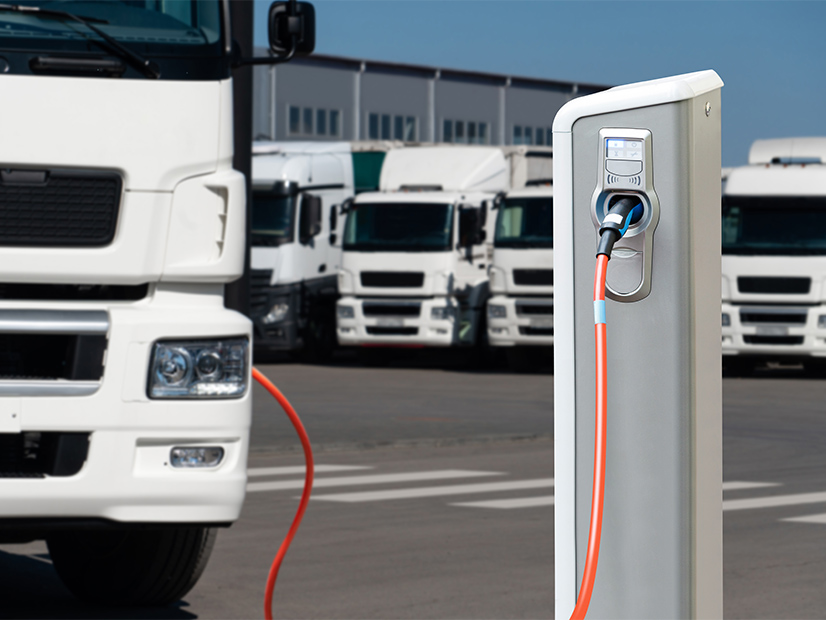In a much-anticipated move, the New Jersey Board of Public Utilities on Oct. 23 adopted minimum filing requirements that allow utilities to propose programs to promote the development of medium- and heavy-duty (MHD) electric vehicle chargers.
The 4-0 vote approving the rules concluded a three-year process to craft a plan to fund and install MHD charging infrastructure that is either publicly accessible or used to set up private fleet charging depots. The plan allows utilities to award incentives totaling up to $55 million over two years for charging infrastructure projects that meet the criteria.
State officials consider the availability of a heavy-duty charging system key to tackling the largest source of carbon emissions in the state: transportation. The goal is to motivate truck users to adopt electric vehicles by removing the fear that they will run low on power en route and won’t be able to find a recharge site.
The approval follows the initial release of a “straw proposal” of rules June 30, 2021, and a second straw proposal Dec. 22, 2023.
“I know this one was long and eagerly awaited,” BPU President Christine Guhl-Sadovy said after the vote.
“A lot of work went into this by staff, by our partners, and certainly by stakeholders in their comments and discussions over the years,” she said. “I think we’re all really excited to see this, and I know relieved.”
The vote came the same day that EPA Regional Administrator Lisa F. Garcia, New Jersey Department of Environmental Protection Commissioner Shawn M. LaTourette, and other federal and state officials gathered at a New Jersey Turnpike rest stop in Ridgefield to mark the receipt of $250 million in federal funds to install MHD EV chargers on the I-95 corridor.
New Jersey and Connecticut, Delaware and Maryland, which make up the Clean Corridor Coalition, will install 450 charging ports at 24 sites along the highway. (See NJ To Install 167 Heavy Truck Chargers with $250M Federal Grant.)
The BPU’s process, however, is separate from the highway projects, which won’t be affected by the BPU’s rules, spokesman Bailey Lawrence said.
Anjuli Ramos-Busot, director of the New Jersey Sierra Club, called the approval a “huge milestone not only for clean transportation, but also for climate and clean air.”
“New Jersey is one of the most densely populated states in the nation, and as such, our transportation sector is one of the dirtiest,” she said. “Electrifying fleets at a local and state level will directly benefit our communities who experience roadway pollution.”
She added that “we are hopeful the utilities in the state will follow through with good programs to electrify our fleets and charging infrastructure that contain equity provisions.”
Shared Responsibility
The rules make the four electricity utilities that serve the state — PSE&G, Jersey Central Power and Light (JCPL), Atlantic City Electric (ACE) and Rockland Electric Co. (RECO) — “responsible for the wiring and backbone infrastructure necessary to enable a robust number of MHD make-ready locations throughout the state.” Each utility must file a two-year MHD plan within 120 days of the order’s approval.
The order describes a “shared responsibility model (that) will bring significant investment into MHD EV charging while protecting consumers and ratepayers, facilitating a smooth rollout of EV charging infrastructure.”
Private infrastructure companies, site owners and industries will own, operate and install the chargers, and an industry working group will address emerging issues such as rate levels, demand chargers and other factors, including interconnection, local generation and storage issues, the order approved by the board states.
Utilities can invest in and earn a return on backbone and infrastructure make-ready wiring for publicly accessible charging depots, those that serve public-serving fleets and government agencies. In each case, the utility can provide up to 100% funding, including offering incentives.
Utilities also can invest in infrastructure that supports private fleet charging depots that are in overburdened communities or municipalities but can provide only up to 50% funding, including incentives, according to the rules.
But utilities can own and operate MHD charging stations only in certain circumstances, according to the rules. That can happen if the proposed charging station is in an area of “last resort,” in which no private company has stepped up to install a charger for 18 months, and 24 months if the station is in an overburdened area, according to the rules.
This “shared responsibility model will bring significant investment into MHD EV charging while protecting consumers and ratepayers, facilitating a smooth rollout of EV charging infrastructure,” according to the board order.
The rules provide for PSE&G to award incentives up to $30 million, JCPL to award up to $15 million, and ACE and RECO to award up to $5 million each.
“Providing more charging for electric delivery vans, trucks, school buses and transit buses, especially for public fleets, is the path forward to clean our air and clean our fleets,” said Doug O’Malley, director of Environment New Jersey. “This board action will help pave the way for an electric bus and truck future.”



